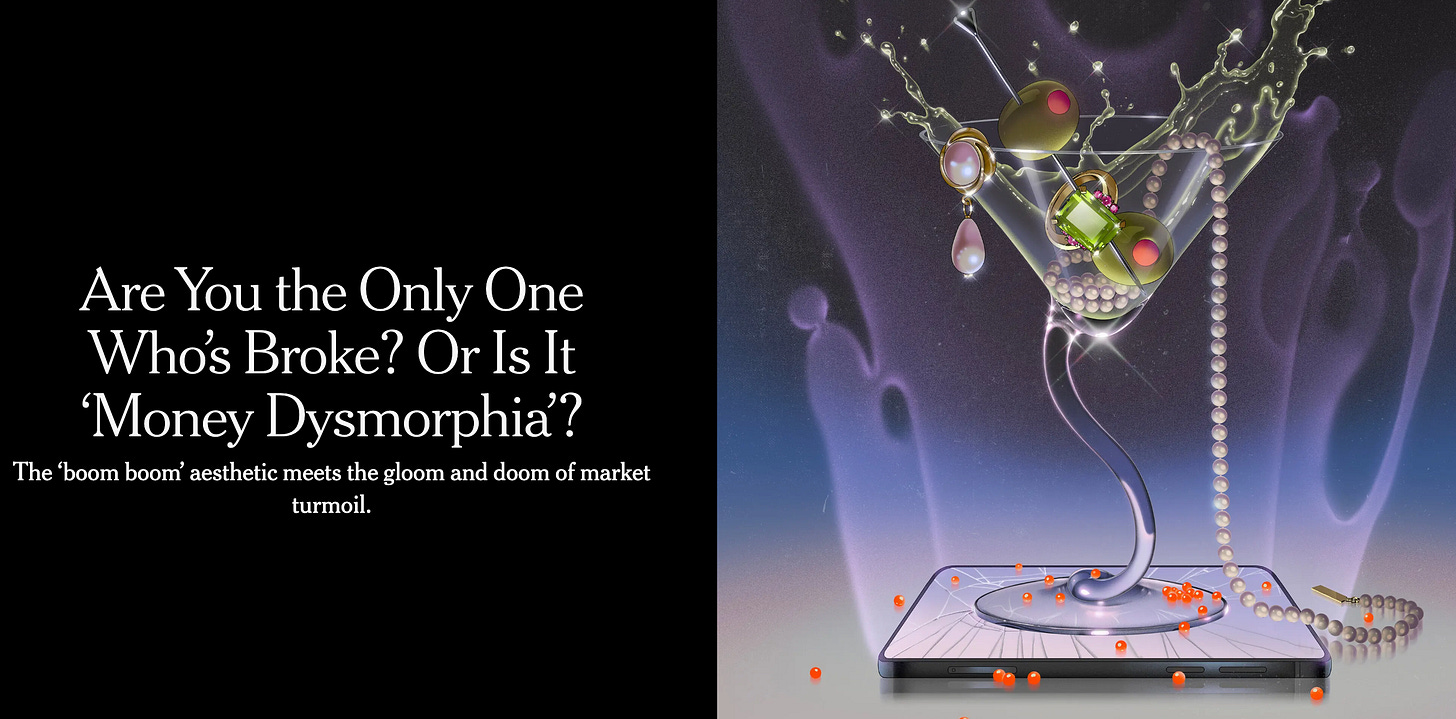Some holy and unholy shit.
Jesus is trending. Popstars are promoting techno-dystopia. Something about the Roman Empire. Buzz around buzz. And how to spend it.
Hello dear reader,
I spent Easter weekend at my aunt’s house—a small Dutch town with nothing but sheep and people who greet you when they pass by. As I walked to the local grocery store with my dad, obsessively refreshing my inbox for an important email and barely looking up, I suddenly became aware of the cliché I had become: the annoying city person who believes life only exists in the city.
On Easter morning, we decided to attend the local church service. After a lavish breakfast, we made our way there—only to find the doors not just closed, but locked. Punctuality has never been our family’s strongest suit, and I suppose on Easter Sunday, we deserved a little divine punishment for that.
Apparently, we weren’t the only ones indulging in celebratory meals. It seems like we’re all (in The Netherlands at least) spending a little more lately—looking for reasons to treat ourselves. A dinner here, a solo coffee there, a champagne brunch to distract from the generally apocalyptic vibe. Supermarkets are making bank. Christmas is still the gold mine, but Easter? It’s coming for the throne.
As Jesus rose from the grave, I was being stuffed by my family and thought about the following things:
Gen Z Is Going to Church
Unlike millennials, Gen Z appears to be showing a renewed interest in Christianity — particularly in evangelical communities. This shift can be attributed to several overlapping factors. In a world defined by climate anxiety, economic precarity, inflation, political instability, a mental health crises, a pandemic, a sociopathic fascist rolling back critical race theory in university curriculums and pushing laws in Southern states mandating that boys get ‘boy haircuts’ and girls ‘girl haircuts’ — yes, really—and God knows what else, many young people are seeking clarity, structure, and meaning. For some, the church offers just that: a defined moral framework, a sense of community, and timeless rituals in a culture that feels increasingly disconnected.
There’s also a visible rise in socially conservative values among subsets of Gen Z, particularly around topics like gender roles, abortion, and immigration. Platforms like TikTok, YouTube, and Instagram allow charismatic conservative influencers — often dressed in Yeezys and quoting Bible verses — to reach millions. They blend moral authority with internet culture, making their messages more digestible, even aspirational.
Many evangelical churches have become especially adept at marketing themselves to younger audiences. Think: rebranded Sunday services that resemble concerts, pastors who drop slang and meme references in their sermons, prayer groups that double as social events with craft coffee and curated playlists. Hey, who said church can’t be “cool.”
What’s striking is how this revival isn’t just about belief. It’s also aesthetic. Online, religion is often repackaged with a certain nostalgic or ironic “vibe”: pictures of a church stage resembling a Coachella set or “Catholic girl fall” TikToks. For some, faith becomes a kind of identity performance, part moral anchor, part personal brand.
This trend doesn’t mean Gen Z is becoming uniformly conservative or devout, but it does suggest that religion is no longer simply seen as passé or oppressive by default.
I also think the pull towards spirituality, and more specifically evangelical Christianity, is linked to two other things: the failure of the political left and the ongoing influx of American culture. Gen Z grew up thinking existential chaos was just... normal. The world has felt like one big meta clusterfuck for as long as we can remember. We’ve been raised on a steady diet of crises; economic, environmental, political and it’s desensitised us to the point where irony, memes and dark humour have become our coping mechanisms.
The political right, for all its dangers, still offers some kind of grand narrative — something with spine, however insane. The left, on the other hand, has spent decades neglecting the emotional and existential needs of people. There's no bigger story to believe in. Some young people feel culturally aligned with leftist values, but ideologically they’re orphaned. What are we rallying behind? they might ask themselves. The utopias of the past are either dead or malfunctioning. The U.S.-exported model of evangelicalism, for a growing number of Gen Z’s, is filling this gap.
More America: On Trump’s trade tariffs..something about it feels strangely Roman.
I read an intriguing opinion piece in the Financial Times over Easter weekend, where Gillian Tett reflects on the political phenomenon of "bread and circuses" — the tactic Roman emperors used, distracting the populace with gladiatorial games to avoid addressing structural reforms. Is this what’s happening in the US right now? And if it is, how long will this distraction technique work before it backfires on Trump? The Trump administration is promoting the idea that tariffs will lead to greater American self-reliance, and that re-industrialisation will ultimately benefit the national economy. Essentially, the message boils down to: “Have patience, the pain will be worth it in the end.” But in the land of the free, sacrifice has never been particularly hot. Perhaps there’s hope yet for the MAGA empire to start collapsing.
Pets as pseudo-babies: Birth rates are dropping, but dogs in strollers are trending. Look around you.
When I was in Seoul, one thing that really stood out was the little white fluffy dogs in strollers. My sister and I had far too much fun pretending to be dog owners — we hijacked a few stuffed dogs from the Muji store, took pictures, and sent them to our dad with the message, “Got ourselves a dog at last.” Even after returning to Amsterdam, I kept seeing the fur babies. I started thinking about it. Could pets really be surrogate babies?
In 2016 The Cut wrote a piece, encouraging pet owners not to refer to their pets as “their babies”. About this M.A. Wallace writes the following:
“Parenting is our connection to the future, the means by which we attempt to influence what tomorrow’s world will be. When people with pets take the title of “parent” and blur the line between pets and children, our language is distorted in a way that only adds to our confusion and anxiety. It may be a gentle delusion to think of your pet as your “child,” but it’s still a delusion. Misnaming our relationship with pets isn’t just a lighthearted goof. It’s a retreat from the world.”
I get this point. There’s a funny contradiction to owning a pet: we cherish them for not being human, yet spend their entire lives treating them as if they were. Things we’d rather see in ourselves and in others, we project onto them. Deep down, we don’t want them to be truly animal; wild, free, impossible to fully understand. We want them to be like us, only simpler. Something we can manage. More easily, at least, than a baby we’d have to raise into a functioning adult.
The buzz around Adolescence: Sure, it’s good that we’re finally talking about toxic masculinity and online misogyny. But did it really take a Netflix hit to get governments to care? Why does it always take a billion-dollar company to validate the work of scholars and activists?
If you’re wondering about the same thing read this article in The Atlantic:
“There’s a real question here about whether we’d even care this much about Jamie’s trajectory if it weren’t tucked inside prestige television.”
And this Substack:
“Is it only when a boy kills that we suddenly feel the urge to understand what’s been radicalizing him?”
The point that I and these articles try to make is this: the sensationalism often required to spark public discourse reveals a deeper issue, namely that we’re not engaging with these topics early or seriously enough in other domains like education, policy, or parenting until media dramatises them.
A glossy ad campaign for techno-dystopia: why Katy Perry going to space marks a vibe shift
Remember when pop stars posed half-naked on horses for perfume ads or launched their own water or makeup brands? Now they’ve traded that in for a space career — lasting exactly eleven minutes.
Shortly after reading the news, I came across a clip of Emily Ratajkowski criticising Katy Perry and the other women in the rocket for framing their trip as feminist. Progress. Always juicy when celebs judge other celebs — I live for it. But Ratajkowski had a solid point: she questioned the morality of funnelling massive resources into space tourism while the world deals with climate collapse and rising inequality. And then wrapping it in the language of feminism? Please.
Katy Perry going to space has nothing to do with genuine curiosity or empowerment. It’s the Instagrammification of aspiration. Void of substance, packaged to feed a techno dictatorship. I read a newsletter by The Trend Report that perfectly summed it up: the death of subcultures has left us with vibes; fleeting, commodified, brand-safe vibes. The shift is from organic, grassroots cultural movements to algorithm-fed, hyper-curated aesthetics.
The space launch may have been presented as a feminist milestone, but it was hollow. Empty of meaning, empty of resistance.
Can somebody get Katy help? Anybody?
And finally... “You’re probably suffering from money dysmorphia.” I know I am.
The New York Times recently highlighted the term “money dysmorphia”. It’s a term suggesting a distorted perception of one’s financial situation, leading people to spend beyond their means to maintain a certain lifestyle of image. You might not find it surprising that this is very common among zoomers. When I finished reading the article, I felt diagnosed. Confronted. But also… weirdly seen. Even though I’ve got some money saved from a previous job, I’m currently unemployed — and still, I somehow manage to buy overpriced coffee almost every day. I’ll wander into a store “just to look” and walk out with a shirt I didn’t need but now emotionally depend on..a little bit. Yesterday, at a particularly low point, I seriously considered sending foot pics to a man with a foot fetish. He DMed me offering a $1000 weekly allowance. I didn’t do it. Yet.
TikTok Made Me Buy It
Money dysmorphia isn’t new. Last year, Gen Z was crowned the “fuck-it spending” generation — splurging on skincare, clothes, holidays, fancy dinners, and other forms of so-called self-care. Internet culture has convinced us we’re more financially stable than we really are, tricking us into spending like we’ve got it.
But deep down, we know that’s not true. We feel it when we transfer money out of our savings just to cover groceries. When we scroll through real estate listings (for fun!) only to find house prices orbiting some distant reality. The reminders are constant — and yet, somehow, not enough to make us stop.
That’s all for now, dear reader.
Bye,
Naomi














Refreshing and insightful! Keep up the great job you are doing! 😘